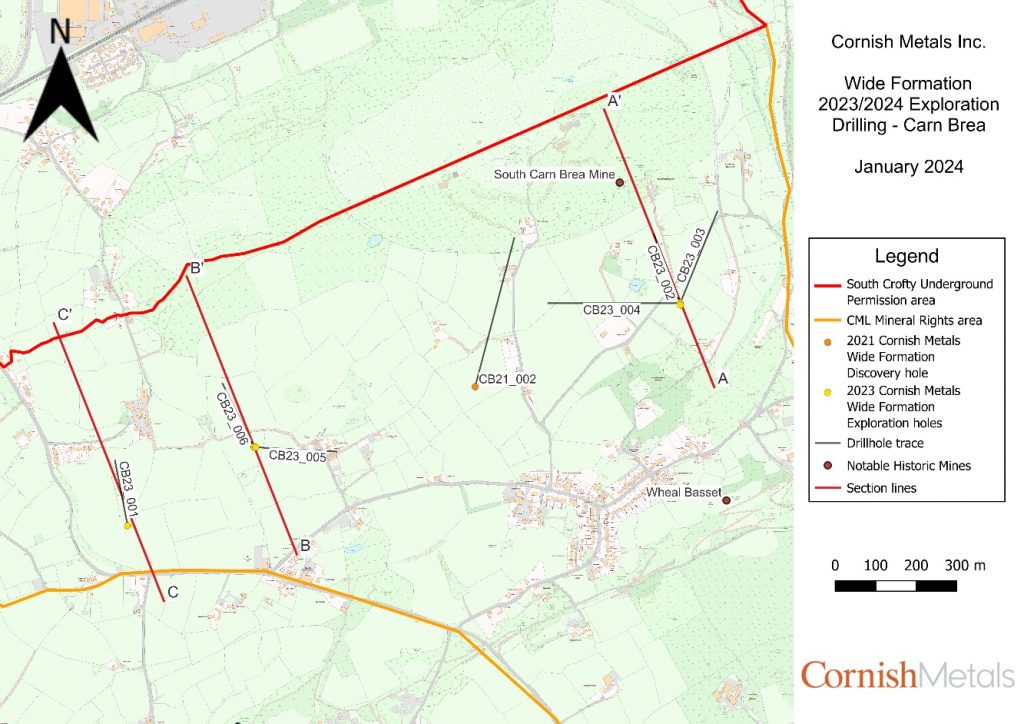Cornish Metals Inc. (TSXV:CUSN) has announced promising results this week from the first six drill holes of its ongoing 9,000 metre Carn Brea drill programme at the South Crofty tin project located in Cornwall, United Kingdom.
Richard Williams, CEO and Director of Cornish Metals, commented in a press release: “These results confirm Cornish Metals’ model that the Wide Formation represents a new, large-scale, tin-bearing exploration target lying beneath the historically mined Great Flat Lode. The discovery of additional mineralised structures above and below the Wide Formation is a bonus. The intensity of alteration and the strength and thickness of the Wide Formation structure is similar to others in the region, and the next step for us is to define the location, orientation and extent of the high-grade pay shoots, which are typical of this style of mineralisation. The discovery of the Great Flat Lode Splay and the other new zones of high-grade tin mineralisation demonstrates the exploration upside of this area, which we view as having tremendous potential to add to our current Mineral Resource base at South Crofty.“
The Carn Brea programme aims to advance South Crofty, a formerly producing tin mine, towards a construction decision by delineating mineralization. All six initial drillholes successfully intersected the Wide Formation lode structure, characterized by strong tourmaline alteration and variable tin grades. This is consistent with other historically mined tin-bearing structures in the greater South Crofty area.
Importantly, drilling identified a newly discovered mineralized zone beneath the Great Flat Lode referred to as the “Great Flat Lode Splay,” as well as multiple high-grade, steeply dipping tin intercepts between the Great Flat Lode and Wide Formation.
The Wide Formation itself represents a significant new high-grade tin exploration target at the Carn Brea South area along the southern boundary of South Crofty’s underground mine permission area. The 14-hole, 9,000-metre campaign that started in Q3 2023 aims to define geometry and continuity of tin mineralization within the Wide Formation target, which measures 2,500 metres in strike length northeast-southwest and 525 metres in depth extent to the southeast.
To date, drilling has successfully intersected the Great Flat Lode and Wide Formation structures where predicted, confirming strike continuity of 1.6 kilometres and 525 metre depth continuity for the Wide Formation target. Two rigs are currently drilling on site, with holes 008 and 009 recently completed and more planned to further test the system along strike and improve target definition at depth.
Discovery of the Great Flat Lode Splay just beneath the Great Flat Lode was another important development from recent drilling. The splay structure is mineralized, up to 9 meters thick based on intercepts, and represents a compelling new target beginning only 280 metres below surface.
Additionally, multiple steeply dipping, high-grade tin intercepts were recorded between the Great Flat Lode and Wide Formation targets. Determining true orientations and thicknesses of these newly identified zones will require more work, but their discovery adds upside. Areas, where these high-grade structures intersect the Great Flat Lode and Wide Formation, may prove especially prospective due to increased fracturing and fluid flow.
According to Cornish Metals, the geology at its Carn Brea South exploration area matches that of the historic South Crofty mine, with metasediments overlying granite intrusives. Mineralization within the Wide Formation consists of tourmaline and disseminated cassiterite hosted in silicified, tourmaline-altered granite. The Great Flat Lode Splay also occurs as a tourmaline-rich structure with quartz and cassiterite hosted in altered granite. Neither the Wide Formation nor the newly discovered Great Flat Lode Splay have been previously mined.
Overall, the results validate the Carn Brea drill program’s objectives of expanding high-grade tin mineralization defined at South Crofty. Ongoing exploration will focus on better defining these new discoveries through step-out drilling and additional target delineation work. The company believes the Wide Formation, Great Flat Lode Splay and other steeply dipping high-grade tin zones warrant significant further study given these initial promising results.
Highlights from the results are as follows:
Wide Formation Mineralisation Confirmed Over a 1.6km Strike Length
New Great Flat Lode Splay Discovered
Multiple New Mineralised Structures Intersected Between the Great Flat Lode and Wide Formation
All six drill holes intersected the Wide Formation at the expected target depths, proving the exploration model for a parallel tin mineralised structure beneath the Great Flat Lode;
Wide Formation structure has been confirmed over a strike length of at least 1.6km, a downdip extent of at least 525m, thicknesses ranging from 1.8m – 4.8m, and remains open;
Notable tin intercepts from the Wide Formation (Figure 2 and Figure 3), including:
1.21m grading 0.87% Sn in CB23_004
1.90m grading 0.83% Sn in CB23_006
Notable tin intercepts from the newly identified Great Flat Lode Splay (Figure 2), including:
3.38m grading 1.01% Sn in CB23_002
1.00m grading 1.56% Sn in CB23_004
Notable tin intercepts from multiple steeply-dipping, high-grade tin zones mainly intersected between the Great Flat Lode and the Wide Formation, including:
0.30m grading 7.48% Sn and 3.09m grading 1.21% Sn in CB23_001
1.21m grading 1.83% Sn in CB23_004
3.06m grading 0.93% Sn in CB23_005
1.17m grading 0.62% Sn in CB23_006
A further eight drill holes are planned, testing a 2.5km strike length of the Wide Formation;
Table 1 – Selected drilling results from holes 1-6 at the Wide Formation target.
Note 1 – True thickness of down-hole intersections reported are expected to be approximately 70-100% of the down-hole lengths.
Table 2 – Drill hole lengths from surface to end of hole.
The above references an opinion and is for information purposes only. It is not intended to be investment advice. Seek a licensed professional for investment advice. The author is not an insider or shareholder of any of the companies mentioned above.
I specialize in the mining industry, focusing on top global mining stocks. My reporting covers the latest industry news, company/project developments, and profiles of key players. With a degree in finance and economics from the University of Toronto, I’ve contributed to a wide range of industry publications. Beyond my professional pursuits, I have a keen interest in global business and a love for travel.
Comments are closed.





